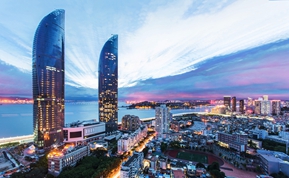Lawmakers call for better gov't work in FTZs
BEIJING - Chinese lawmakers on Thursday urged pilot free trade zones (FTZs) to transform government functions and making systematic innovation their touchstone.
Members of the National People's Congress Standing Committee reviewed a report made Wednesday by Vice Premier Wang Yang on FTZs.
Bao Kexin, a member of the NPC agriculture and rural affairs committee, said the difficulty with FTZs was not top-level design, but the ideas and concepts held by officials in FTZs.
Administration in FTZs has not been transformed from direct to indirect and supervision is not yet well established, Bao said, complaining that government functions in the FTZs still have much in common with the planned economy.
The first pilot FTZ was established in Shanghai in 2013, and another three were launched on Tuesday in Tianjin, Guangdong and Fujian. They will also test policies to integrate China with international practices.
Bao urged the State Council and the FTZs to train staff to be more flexible.
In Wednesday's report, Vice Premier Wang Yang said the Shanghai FTZ is successful in its negative list approach, facilitating trade, financial reform, and in its supervision system.
However, Fang Xin, an NPC Standing Committee member, said the report lacked any social evaluation and, as far as she knew, many businesses were registered in the FTZ, but few operate there.
Lyu Wei, a member of NPC's financial and economic affairs committee, said many regions want FTZs, but most are just hoping for preferential policies.
The financial and economic affairs committee reported on FTZs earlier this month, saying their focus should be on systematic innovation rather than preferential policies and no more FTZs be opened until a better coordination mechanism prevents policy disputes.
Wang Yang said Wednesday that a system involving 30 departments had been established in recent days in a bid to address the issue.
Why Xiamen
-

Xiamen is one of the most economically competitive cities in China and was one of the first Special Economic Zones on the Chinese mainland. As a vice-provincial city independently listed on the State development plan, it has provincial-level authority in economic administration and local legislative power. In 2010, the Xiamen SEZ was expanded to cover the entire municipality. Today, Xiamen is a modern and international port city.
